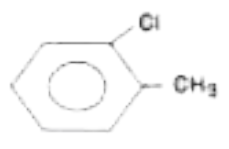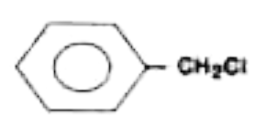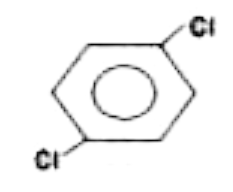Which of the following alkyl halides undergoes hydrolysis with aqueous KOH at the fastest rate ?
CH3CH2CH2Cl
CH3CH2Cl
CH3CH2CH2CH2Cl
CH3CH2CH(Br)CH3
The correct Answer is:D
To determine which alkyl halide undergoes hydrolysis with aqueous KOH at the fastest rate, we need to analyze the structure of the alkyl halides provided in the options. The hydrolysis reaction involves the substitution of the halogen atom by the hydroxide ion (OH⁻), which acts as a strong nucleophile.
1. Identify the Type of Alkyl Halides:
- Alkyl halides can be classified into primary, secondary, and tertiary based on the carbon atom to which the halogen is attached.
- Primary alkyl halides have the halogen attached to a carbon that is bonded to one other carbon, secondary to two, and tertiary to three.
2. Understand the Mechanism of Hydrolysis:
- Hydrolysis of alkyl halides can occur via two main mechanisms:
- SN1 Mechanism: This mechanism is favored for tertiary alkyl halides where the formation of a stable carbocation intermediate occurs.
- SN2 Mechanism: This mechanism is favored for primary alkyl halides where the nucleophile attacks the carbon simultaneously as the leaving group (halogen) departs.
3. Evaluate Stability of Carbocations:
- Tertiary carbocations are more stable than secondary and primary due to hyperconjugation and inductive effects.
- Therefore, if an alkyl halide can form a tertiary carbocation, it will undergo hydrolysis faster.
4. Analyze the Given Options:
- Assuming we have options such as:
- A: 1-bromopropane (primary)
- B: 2-bromobutane (secondary)
- C: 2-bromo-2-methylpropane (tertiary)
- D: 1-bromo-2-methylpropane (primary)
- Among these, 2-bromo-2-methylpropane is a tertiary alkyl halide.
5. Conclusion:
- Since tertiary alkyl halides undergo hydrolysis via the SN1 mechanism, which is faster due to the formation of a stable carbocation, 2-bromo-2-methylpropane will undergo hydrolysis with aqueous KOH at the fastest rate.
Final Answer:
The alkyl halide that undergoes hydrolysis with aqueous KOH at the fastest rate is 2-bromo-2-methylpropane (the tertiary alkyl halide).
- Alkyl halides can be classified into primary, secondary, and tertiary based on the carbon atom to which the halogen is attached.
- Primary alkyl halides have the halogen attached to a carbon that is bonded to one other carbon, secondary to two, and tertiary to three.
- Hydrolysis of alkyl halides can occur via two main mechanisms:
- SN1 Mechanism: This mechanism is favored for tertiary alkyl halides where the formation of a stable carbocation intermediate occurs.
- SN2 Mechanism: This mechanism is favored for primary alkyl halides where the nucleophile attacks the carbon simultaneously as the leaving group (halogen) departs.
- Tertiary carbocations are more stable than secondary and primary due to hyperconjugation and inductive effects.
- Therefore, if an alkyl halide can form a tertiary carbocation, it will undergo hydrolysis faster.
- Assuming we have options such as:
- A: 1-bromopropane (primary)
- B: 2-bromobutane (secondary)
- C: 2-bromo-2-methylpropane (tertiary)
- D: 1-bromo-2-methylpropane (primary)
- Among these, 2-bromo-2-methylpropane is a tertiary alkyl halide.
- Since tertiary alkyl halides undergo hydrolysis via the SN1 mechanism, which is faster due to the formation of a stable carbocation, 2-bromo-2-methylpropane will undergo hydrolysis with aqueous KOH at the fastest rate.
The alkyl halide that undergoes hydrolysis with aqueous KOH at the fastest rate is 2-bromo-2-methylpropane (the tertiary alkyl halide).
Topper's Solved these Questions
- HALOALKANES AND HALOARENESBOOK - NCERT FINGERTPS ENGLISHCHAPTER - HALOALKANES AND HALOARENESEXERCISE - Higher order thinking skills
8 Videos
- HALOALKANES AND HALOARENESBOOK - NCERT FINGERTPS ENGLISHCHAPTER - HALOALKANES AND HALOARENESEXERCISE - Exemplar problems
24 Videos
- HALOALKANES AND HALOARENESBOOK - NCERT FINGERTPS ENGLISHCHAPTER - HALOALKANES AND HALOARENESEXERCISE - Physical properties
7 Videos
- GENERAL PRINCIPLES AND PROCESSES OF ISOLATION OF ELEMENTSBOOK - NCERT FINGERTPS ENGLISHCHAPTER - GENERAL PRINCIPLES AND PROCESSES OF ISOLATION OF ELEMENTSEXERCISE - Assertion And Reason
15 Videos
- POLYMERS BOOK - NCERT FINGERTPS ENGLISHCHAPTER - POLYMERS EXERCISE - NCERT Exemplar
9 Videos
Similar Questions
Knowledge Check
Which of the following is an aryl alkyl halide.
A B
B C
C DNone of these
DNone of these
Which of the following salts undergoes hydrolysis ?
View SolutionWhich of the following salt undergoes hydrolysis?
View SolutionWhich of the following salts will not undergo hydrolysis in water?
View SolutionWhich of the following metal sulphide does not undergo hydrolysis?
View SolutionWhich salt undergoes hydrolysis?
View SolutionWhich of the following alkyl halide will undergo SN1 reaction is
View SolutionWhich of the following alkyl halides is iso -butyl bromide ?
View Solution
